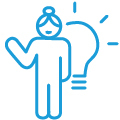Economic Development
Empowerment to be agents of change
In the regions where we operate, the majority of people live in poverty. Unemployment is very high, particularly among women and young people. The inhabitants lack appropriate training, professional opportunities and support.
Some figures : In India, more than 65% of the population lives in rural areas, where it is difficult to find work and food. In Nepal, approximately 80% of the population lives in rural areas where they support themselves through farming and raising livestock , the yields of which depend on the vagaries of the weather.

Economic insecurity, which mainly affects women, has been exacerbated by the Covid-19 crisis, which has pushed millions of people below the poverty line. Economic development programs are now more essential than ever. Our centers provide training to strengthen and further develop skills in crafts, agriculture, IT, entrepreneurship and innovative technologies.
In India, we also provide financial support for the creation of micro-enterprises, while in Nepal, we concentrate our efforts in rural areas that are often very difficult to access, thereby helping people to acquire skills that they can then use to benefit the whole village.
Notre impact en 2024

712 young people in computer classes

705 financial grants for a micro-business

442 farmers trained in agricultural entrepreneurship

289 women trained in crafts
One of our programs in India
Fostering entrepreneurial independence
To overcome poverty and become self-sufficient, the men and women we support just need a little financial and technical help.
In isolated regions with high unemployment rates and few job opportunities, we provide financial, material and technical assistance to help entrepreneurs launch or maintain their businesses. Women are the main beneficiaries of this project, enabling them to challenge the patriarchal system still in place and become true agents of change.
Before the lockdown, I ran a shop in a town far from home, but due to the pandemic, I had to close it down. When the situation improved, I realized that my village had no nearby shops. Karuna-Shechen gave me the support I needed to start a new shop in my village and, in the future, I plan to expand my business to a new area.
Lassang Tamang, woman entrepreneur in Darjeeling